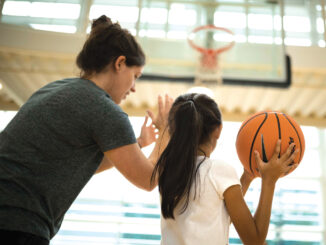
She was 10, she was tough, and she was trouble.
We were in our third year of producing a Summer basketball league for fifth-through-seventh grade girls.
In May of each year, we conducted a week-long skills clinic that preceded the Summer league. We had high school players lead drills for our younger girls so our coaches could view players and establish their draft strategies.
I noticed Brittany right away. She was overly aggressive, confrontational, and sometimes taunting other players. My fellow coaches expressed relief that Brittany was a fourth grader and was a year too young to be drafted onto a Summer team.
Their demeanor changed when I called them to a stand-up meeting after the clinic and told them I wanted each of us to have one fourth grader on our teams. As a group, they were shaking their heads and offering reasons why they disagreed with me. But as we talked, they began to reveal that the true basis for their disagreement was Brittany. None of them wanted to spend the Summer having to deal with such a hardened 10-year-old.
I listened to them and I understood. But Brittany was the only reason I wanted fourth graders in the league. I wanted her on my team because my motive for coaching youth basketball had been greatly shaped in the beginning by a friend who had told me, “Bobby, it’s more than basketball. You have a chance to help kids and show them what is right. You have an opportunity to set kids on right paths.”
That struck me with great impact. I had only known coaching as a push to compete at a high level, but his words bore into me like a fish hook that wouldn’t come out. I couldn’t stop thinking about it, and the thoughts that followed took me back to my childhood, which had been greatly troubled and filled with confusion and feeling unvalued, especially by adults who didn’t seem to notice me or care even if they did notice.
Except … a basketball coach who paid my way onto a private team and a music instructor who gave me private lessons for free. Both of them knew of the fractures in our family and the negative paths those difficulties were taking me. Both of them invested in me and, although those were temporary situations, they gave me direction and a greater sense of value, and here I am, decades later, still honoring what they did.
With my friend’s words and those memories, the priorities of coaching youth sports changed for me. Winning on the scoreboard was a distant satisfaction compared to winning in the lives of kids, especially those who were struggling.
When I saw Brittany, I knew she was “one of those” and I explained to the coaches, “Brittany is the reason I want to do this. You don’t have to have her on your team. We can ‘wire’ her to my team.”
They said I was crazy but as long as they didn’t have to deal with her, they were fine.
I knew she would be tough, but if I was vigilant, diligent, purposeful, and genial, I might succeed, and the tougher the mission, the greater might be the rewards.
I admit I had second thoughts after driving to her home to return her basketball and seeing that she came from a family with fast cars, a fast boat, loud voices, and beer cans on the porch.
Yikes!
When our first practice began, it was less than 10 minutes before Brittany confronted a teammate. I had prepared a plan for that in between the draft and our first practice. It was time to put that plan into action.
I called Brittany to me. Her face looked hard but also questioning, as if wondering how I would scold her.
Instead, I was silent. I tugged on her shoulder and arranged her to stand next to me. I put my arm lightly around her shoulder to reassure her that everything would be okay. I still didn’t say a word.
Two minutes in the life of a ten year old seems to them like an eternity. She squirmed and shuffled her feet and asked when she could go play again. I didn’t answer. I just kept a friendly hand on her shoulder and was surprised she didn’t rebuff it.
We did that four times during that practice. I would love to tell you that just a silent side hug completely changed Brittany’s behavior, but it didn’t. But, it was a start.
The second practice went much the same but at the end, after all of the other players had been picked up by their parents, I saw Brittany sitting on a low brick wall with her head down. If I was seeing things correctly, Little Miss Tough Girl was crying, although she would never admit to it.
I approached her and sat beside her and asked what was wrong. She told me to go away. Instead, I just shut up — for another two-minute eternity. With a little coaxing, I finally got her to talk and with her head still down, she said, “No one likes me! No one wants to be my friend! They all hate me! I want to quit!”
In the few minutes that followed, I assured her that there was nothing wrong with her and how I had felt the same when I was 10. I said many things but it seemed that the one that perked her head up was when I explained to her that “to make a friend, you have to be a friend” and suggestions on how to make that happen.
Her mother appeared. We hadn’t noticed her pull into the parking lot so it was a bit of a surprise. She saw her daughter’s red eyes and asked, “What’s going on?”
I explained our conversation and continued to counsel Brittany with things she could do that would make her a part of the team. Brittany said she would try the things I had told her. I gave her another hug and told her to be patient with herself. She probably wouldn’t be perfect, but the more she tried, the better she would get.
At the very next practice, she began putting the ideas to work. Although she stumbled, several of her teammates began to see that she was trying and they began to warm to her.
In the many practices that followed before the start of the Summer league, she continued to make strides and it was clear that she was gaining the trust of her teammates and integrating faster than I had expected.
After another practice, Brittany pulled me aside and said she was so happy and that it meant so much to her to fit in with the others.
“Brittany,” I said, “if you can do it here, you can do it at school. You can do it with your brothers. There are a million friends waiting for you far beyond this basketball court. If you can do it here, you can do it anywhere!”
I felt waves of warmth go through me when she smiled and nodded and walked away.
But, making friends was not the only challenge for her.
- In basketball, her hand skills weren’t at all developed.
- In school, her grades were awful.
I felt a strong need to help Brittany be a success in the Summer, but she wasn’t physically big enough to compete close to the basket against seventh graders and she lacked ball-handling skills needed to excel at guard.
So I worked on a plan and I gave her a basketball and trained her in shooting mechanics and told her to shoot, shoot, shoot three-point set shots at home because if she did, I would get her open on the wing and she would score a lot of points.
She actually did it and by mid-Summer, defenses had to deal with her because if they didn’t she would hit three-pointers and score in double-digits.
At the end of that Summer, her mother thanked me for working with Brittany and helping her in so many ways. I credited Brittany because she was the one who had to be willing to put in the work to make it all happen.
Then, I got firm eye contact with Brittany and I repeated what I had said weeks earlier. “Brittany, if you can do it here, you can do it anyplace. You can make friends with just about anyone and if you can be this successful on a basketball court and do things you never thought you could do, then you can do it anywhere, even in the classroom too. You don’t have to settle for straight ‘D’s anymore.”
Several months later, I was surprised to get a phone call from her mother. I had no idea what reason she would have for calling me and I hoped there wasn’t bad news about her daughter.
She said, “Bobby, do you remember that last day when you told Brittany that if she was better than she thought she was in basketball, then she was better than she thought she was in a lot of other things and there was no reason she should settle for straight ‘D’s?”
Of course I remembered that. I had planned that talk for weeks and couldn’t wait to say it to her once the season ended.
“Well guess what ….” her mother continued. “When we got home that day, she told us she believed what you had told her and she said that not only was she not going to settle for ‘D’s, but she was going to get straight ‘A’s. We all laughed at her. There was no way my daughter was ever going to get straight ‘A’s. But, I’ll be (insert expletives here), she did it! Brittany is a straight ‘A’ student! The entire school year!”
In the months that followed that Summer, Brittany committed herself to developing her hand skills, and 14 months after that Summer, she was recruited onto one of the more elite travel teams in the area. From there, she went on to become a three-year starter at a major high school.
I’ve coached basketball for a long time and I would love to tell you some of the most amazing wins some of the most unlikely teams achieved against some of the most strident odds. Yet, as exciting and magnificent as some of those basketball memories are, they don’t compare to the things I’ve seen kids accomplish once their lives pivoted in the right direction.
Over the years, I’ve come to thoroughly understand this one thing:
If this is just basketball, I would have been out of it a long time ago.


